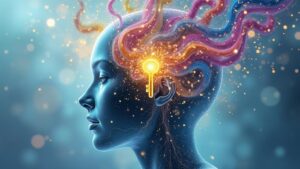
You’ve likely experienced the profound weight of grief, struggling to navigate its complexities and find solace amidst the pain. What if there was a way to transform your grief into healing and growth, making the journey more manageable? Neuro-Linguistic Programming (NLP) offers a structured approach to grief recovery that empowers individuals to honor their loved ones, discover meaning in loss, and foster personal resilience. By applying NLP techniques, you can reframe perspectives, develop healthy coping strategies, and ultimately find a sense of purpose in the midst of loss.
Understanding the Grieving Process
Understanding the grieving process is vital for maneuvering through the complex emotions that come with loss and honoring the journey towards healing and acceptance.
Grief, stemming from death, brings forth a wave of emotions including sadness, anger, guilt, and eventually acceptance. Each individual copes uniquely, drawing from personal beliefs and past experiences.
This emotional turmoil can manifest physically, emotionally, socially, and spiritually, affecting various aspects of life. Acknowledging the stages of grief, such as denial, anger, bargaining, depression, and ultimately acceptance, is essential in navigating this journey.
Embracing Emotions Through NLP
To fully embrace and navigate your emotions in the process of grief, utilizing Neuro-Linguistic Programming (NLP) provides a structured framework for acknowledging and managing your feelings in a healthy and constructive manner. NLP techniques help you acknowledge and embrace your emotions, allowing you to transform sadness into a respectful and controlled emotion, enabling a healthier grieving process.
When unresourceful thoughts arise, NLP assists you in managing them by approaching them with calmness, curiosity, and a focus on growth and learning. Honoring loved ones through NLP involves bringing their memories closer, interacting with them respectfully, and encoding their memory in a resourceful way.
Additionally, finding meaning in loss with NLP entails recognizing the sacredness of life and death, seeking lessons in moments of loss, and encouraging personal growth and self-realization. With NLP, you can navigate your emotions with purpose and find solace in honoring your loved ones while discovering meaning in your grief journey.
Transforming Unresourceful Thoughts

By employing Neuro-Linguistic Programming (NLP), you can effectively shift unresourceful thoughts to promote personal growth and emotional healing. NLP techniques enable you to approach negative memories with a sense of calm and curiosity, creating a space for exploration and understanding.
Through NLP, you can extract valuable lessons from these unresourceful thoughts and memories, turning them into opportunities for growth and development. By transforming unresourceful thoughts using NLP strategies, you open the door to spiritual learning and emotional resilience.
NLP empowers you to put away unresourceful thoughts after learning from them, fostering a path towards personal evolution and self-discovery. Embracing this approach can lead to a profound transformation, allowing you to navigate grief with strength and wisdom, ultimately promoting healing and growth in your journey towards recovery.
Honoring Loved Ones Effectively
Bringing cherished memories closer and engaging with them respectfully is crucial to effectively honoring loved ones. When coping with grief, it’s vital to hold their hand through memories and view the sacredness of their presence in your life.
By looking at their memory through a resourceful lens, you can find comfort and strength in the lessons they taught you. Seeking advice from their memory can provide guidance and solace as you navigate the journey of healing.
Embracing the valuable learnings they imparted while they were with you can help encode their memory in a respectful manner, aiding in coping with the grief of their absence. Honoring loved ones effectively not only allows you to find meaning in loss but also presents an opportunity for personal growth and introspection.
Finding Meaning in Loss With NLP

In discovering meaning within loss with Neuro-Linguistic Programming (NLP), you can reframe your perspectives and beliefs to find opportunities for personal growth and self-realization. NLP offers practical techniques to develop healthy coping strategies, allowing you to navigate the sacredness of the life-death cycle.
Through NLP, you can learn and grow from your experiences of loss by embracing the lessons and blessings hidden within them. By incorporating NLP into your grief journey, you can see the sacredness in honoring and cherishing the memories of your loved ones in a respectful manner. NLP provides you with the tools to transform grief into a pathway for personal growth and self-discovery.
Supporting Others in Grief Journey
When supporting others in their grief journey, sharing coping techniques and practical strategies can profoundly empower them to navigate their healing process effectively. Providing a supportive environment where open discussions about grief and loss are encouraged is crucial, allowing individuals to express their emotions freely and feel understood. Here are three key ways to support someone in their grief journey:
- Offering a listening ear: Simply being there to listen without judgment can make a significant difference in someone’s healing process. Let them share their feelings and thoughts without feeling rushed or dismissed.
- Suggesting healthy coping mechanisms: Introducing coping techniques like journaling, mindfulness, or exercise can help individuals manage their emotions in a positive way and find moments of peace amidst the pain.
- Helping them create a support network: Encourage the individual to connect with others who’ve experienced similar losses or seek professional help if needed. Building a strong support system can provide comfort and validation during challenging times. Remember, your presence and guidance can make a world of difference in their grief journey.

To navigate complex emotions effectively with Neuro-Linguistic Programming (NLP), you can utilize specific tools and techniques designed to help you process grief and loss in a constructive manner. NLP offers strategies to develop coping mechanisms for handling intense emotions associated with loss. By incorporating NLP techniques, you can address deep-rooted feelings of grief and begin to reframe your thoughts surrounding the loss. This approach enables you to navigate through the complex layers of emotions that often accompany grief, allowing you to find a sense of balance and understanding amidst the turmoil.
Through NLP, you can learn to manage overwhelming emotions, transform unresourceful patterns of thinking, and create a more positive emotional state as you navigate through the grieving process. By actively engaging with NLP practices, you can develop resilience in the face of loss, fostering a healthier relationship with your emotions and paving the way for eventual healing and growth. Embracing NLP tools empowers you to navigate the intricate terrain of grief with greater ease and self-awareness.
Solace, Growth, and Healing in Recovery
Find solace, experience growth, and facilitate healing in your recovery journey with the help of Neuro-Linguistic Programming (NLP). NLP techniques offer a transformative approach to grief, guiding you towards healing and growth.
Here are three ways NLP can aid in your journey:
- Facilitating Healing: NLP enables you to reframe negative emotions and memories linked to grief, fostering a healing process that integrates loss into personal growth.
- Encouraging Growth: Through NLP techniques, you can start on a path of self-discovery and personal transformation, allowing for significant growth during the recovery journey.
- Promoting Transformation: NLP empowers you to navigate the complex emotions of grief, leading to a deeper understanding of yourself and your experiences, ultimately facilitating transformation and healing.
Conclusion
You’ve learned how NLP can guide you through grief, helping you honor loved ones, find meaning in loss, and grow stronger.
Like a beacon in the storm, NLP shines light on your path to healing, resilience, and purpose.
Embrace the journey, transform your grief, and emerge from the darkness with newfound strength and solace.
You have the power within you to navigate through the complex emotions of grief and emerge stronger on the other side.
Take the Next Step
Do not be afraid to reach out to me, Mark E Wilkins, to assist you in any issues you might have. Most Hypnotherapy sessions last 2 hours and EFT Sessions are usually handled with one session. Life Coaching is 45 minute session, once a week. Self-Hypnosis is taught in one session, and lasts a lifetime.
To make an appointment, first listen to the Pre-talk and fill out he Complementary Healthcare Provider Disclosure. The use the Contact Form to request an appointment with the Bohol Hypnosis Expert.
Self-help downloads are available. The self-hypnosis program to teach you how to self-hypnotize is here.





